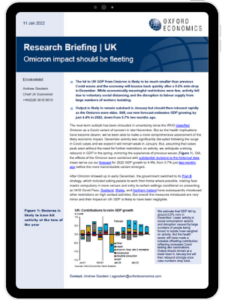Research Briefing
| Jan 11, 2022
Omicron impact should be fleeting for United Kingdom

The hit to UK GDP from Omicron is likely to be much smaller than previous Covid waves and the economy will bounce back quickly after a 0.6% m/m drop in December. While economically meaningful restrictions were few, activity fell due to voluntary social distancing and the disruption to labour supply from large numbers of workers isolating.
What you will learn:
- Output is likely to remain subdued in January but should then rebound rapidly as the Omicron wave ebbs. Still, our new forecast estimates GDP growing by just 4.4% in 2022, down from 5.7% two months ago.
- Nevertheless, a number of high-frequency sources report a marked drop in social consumption activity in December. Most notably, CHAPS data showed a 20ppt decline in debit and credit card spending on social activities during the month.
- Given the relative lack of meaningful restrictions, we attribute the slump in activity to two factors. First, some consumers have adopted a more cautious approach to social consumption given the greater transmissibility of Omicron. Second, the sheer number of cases means large numbers of people were forced to isolate.
Tags:
Related Services

Post
US Key Themes 2026: Exceptionalism amid fragmentation
US exceptionalism is alive and well, and that won't change in 2026.
Find Out More
Post
Global Key themes 2026: Bullish on US despite AI bubble fears
We anticipate another year of broadly steady and unexceptional global GDP growth, but with some more interesting stories running below the surface.
Find Out More[autopilot_shortcode]
